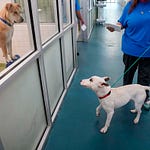
These are some of the stories making headlines in animal protection:
Subscribers can also listen to the podcast above, which includes extended commentary on many of the issues, including the appointment of a special envoy for animals at the State Department for the first time ever. According to the announcement, “Overfishing, pollution, pesticides, disease, urban sprawl and, of course, climate change contribute to declines in imperiled species’ populations worldwide.” The envoy’s job will be to help the U.S. and other countries address these threats to animals. Unfortunately, while the act of appointing a person tasked with representing the interests of animals is progress, we fear that the philosophical approach by which this particular envoy will approach this critical task is not. In fact, rather than looking to create a brighter future, the special envoy appears committed to defending an antiquated one that will exacerbate, rather than lessen, non-human suffering and death.
For those who want to skip the news and go straight to the main discussion, it begins at the 18:25 mark.
There is also a 15-minute sample of the podcast for those who have not yet subscribed. Sample podcasts are also available on Apple, Spotify, and Google Play.
California’s SB 879 banning “the testing of pesticides, chemical substances and other products on cats and dogs” was signed into law. As of January 1, toxicity testing for consumer and industrial goods on dogs and cats will be illegal. Although the legislative sponsor called these tests “barbaric,” the new law allows testing on other animals. It also “exempts medical and federally required testing from the ban.”
Meanwhile, the U.S. Senate passed S.2952, the FDA Modernization Act. The bill removes the requirement that drugs “be tested on animals before they could be used on humans in clinical trials.” Instead, the bill “gives drug sponsors the option to use scientifically rigorous, proven non-animal test methods,” including cell-based assays, organ chips, computer models, and other non-animal or human biology-based test methods.
The bill, sponsored by Sen. Cory Booker (D-NJ) and Rand Paul (R-KY), passed unanimously. It will (hopefully) be taken up and passed in the House of Representatives.
San Francisco is now home to the nation’s first restaurant for dogs. Dogue serves pastries, “dogguccinos,” and on Sundays, soup and “a $75, three-course tasting menu.” Patrons are encouraged to slurp up their soup from the bowl.
If your dog has a knack for being there in times of trouble, it is no accident. Studies have found that dogs can tell human moods by facial expressions and language. They are so good at this, they can figure out whether someone is happy or angry by just looking at the top half of someone’s face. But a new study finds that they do not even have to look at you to know something is wrong.
The study concluded that dogs could detect when people are upset by smell. Specifically, they detect changes in breath and body odor that results from the release of “Volatile Organic Compounds produced by humans in response to stress.”














